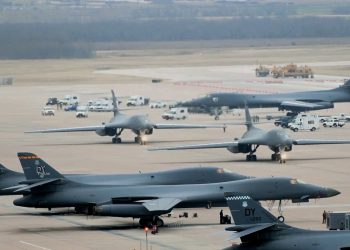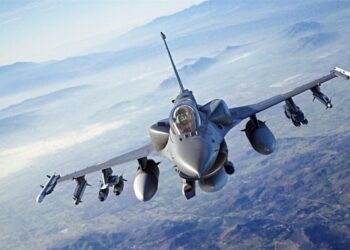Agence France-Presse,
President Vladimir Putin on Tuesday pushed Russia's military aviation industry as a global leader, just days after announcing the resumption of Cold War-era strategic bomber flights.
“Russia has the task of retaining its leadership in fighting, military technology,” Putin said at the opening of the Maks 2007 airshow in the town of Zhukovsky, a major test flight centre just southeast of the Russian capital.
“Russia has new economic potential and will in the future continue to pay particular attention to developing these technologies,” Putin said, adding that the pilots taking part in the airshow were “the best in the world.”
Maks 2007 is a “celebration of aviation in our country” that will also serve as a useful platform for signing export contracts for supplying foreign countries, he continued.
Flanked by the head of Russia's air force, government ministers and foreign guests including Ukrainian Prime Minister Viktor Yanukovych, Putin then viewed a display of aircraft built by jetmakers Sukhoi, MiG and Tupolev.
The planes, most of them fighter jets, thundered and twirled through the hazy summer sky above the Zhukovsky airfield as an announcer called out the speed of the planes and the names of the pilots.
|
A Russian military aircraft takes part in the opening ceremony of the International Aviation and Space salon “MAKS-2007” in Zhukovsky airfield, outside Moscow. President Vladimir Putin on Tuesday pushed Russia's military aviation industry as a global leader, just days after announcing the resumption of Cold War-era strategic bomber flights.(AFP/Viktor Korotayev)
More Military Pictures
|
The head of Russia's state arms export monopoly Rosoboronexport, Sergei Chemezov, later told reporters that Russia had a “strong second place” in the military aviation market after the United States.
Chemezov also said that all the companies owned by Rosoboronexport, which has giant industrial holdings across Russia, would be floated on stock exchanges by 2012.
The Maks 2007 airshow followed Putin's announcement last week that Russia would resume its Soviet-era practice of sending strategic bombers on long-range flights well beyond its borders.
The resumption was consistent with Putin's efforts to boost Moscow's status internationally, but raised fears in Western capitals of a return to Cold War rivalry with Washington.
The strategic bombers were not on display at Maks 2007, but four new military jets — the MiG-35, MiG-29K, Su-35 and Su-32 — were to be showcased at the event, which had 787 exhibitors from 39 countries, officials said.
The Maks airshow was a measure “of the commercial progress of Russian military-technical cooperation with foreign countries,” Chemezov was quoted as saying in a statement.
On the sidelines of the airshow, Chemezov signed a deal worth 330 million dollars (244 million euros) with Indonesia to supply six Sukhoi fighter jets in the biggest ever defence contract between the two countries, officials said.
Rosoboronexport said that it had already signed contracts worth 2.5 billion dollars this year for military aircraft and that it was supplying the air forces of China, India, Indonesia, Malaysia and Venezuela.
Russian arms exports have surged since the industrial slump that followed the Soviet collapse in 1991. Russia's moves to regain Soviet-era markets in Asia, the Middle East and South America have raised hackles in Washington.
But William Hobbins, commander of US air forces in Europe, who also attended the airshow on Tuesday, praised Russia's military aircraft production and said air force cooperation between the two countries was strong.
“I will not discuss the political side but I will tell you that the military-to-military relationships are better than they've ever been,” Hobbins said at a press conference.










